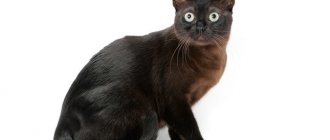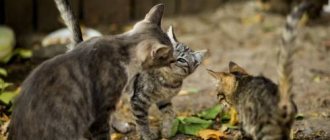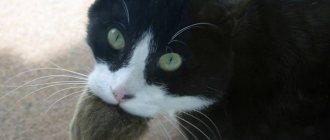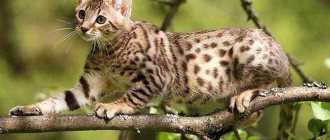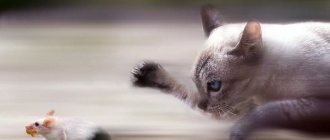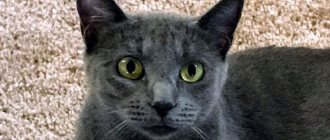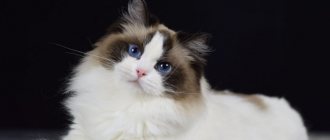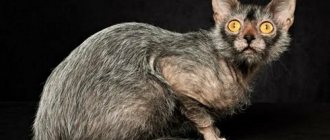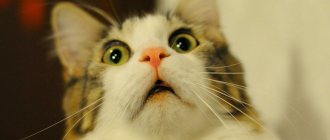When it comes to catching mice, no innovative device can compare with a smart house cat. Fluffy pets have won the love of humans thanks to their ability to destroy rodents. Today, breeders keep cats for the hobby, so pets usually lead a passive lifestyle. For people living in rural areas and having a subsidiary farm, it is important that the cat knows how to catch mice and rats. Rodents periodically appear in every country house and are capable of destroying food and causing diseases. Which cats are better at catching mice, and which breeds are not suitable for hunting?
The role of living conditions
The hunting instinct is present in cats, regardless of variety and gender. To test your skill, you need to scratch your finger across the floor and observe the pet’s behavior. The faster the animal reacts to the sound, the stronger the hunting instinct is. If the cat immediately rushes to the hand, it will be good at catching mice.
Pets living in an apartment and not walking in the yard can catch a mouse, but they will not kill or eat the pest. Animals with the appropriate instinct feed on mice, which can only be taught to a kitten by a mother mousetrap. Animals that grew up in villages or on the street are better at catching rodents, because from childhood they know what a mouse is and how to behave with it. For outdoor cats, hunting is the main way of obtaining food.
Ratcatcher cats for rent: where to find, cost
Buying a real rat catcher is quite difficult: you can be deceived for a lot of money. However, in some cities it is possible to rent a cat. You should know that ratcatcher cats are available for rent from breeders, many specialized nurseries, and animal and pet supply stores. After the rats are killed, the animal is returned.
For a cat, being in a new place with unfamiliar people can be stressful, so you cannot be sure that in such an environment he will catch rodents.
You can rent a ratcatcher cat
For this purpose, you can find a rat-catcher cat via the Internet, using message boards, for example, the site for finding part-time jobs YouDo, or specialized forums. There is no fixed price for such services; sometimes it is set depending on the cost of the cat itself. Typically, the price of such a service varies from 500 to 3 thousand rubles.
Forum participants generally have a negative attitude towards giving their animal to catch rats, since no one wants to create a stressful environment for the cat, and besides, this can be dangerous: the rats may already be poisoned.
The importance of a pet's appearance
Success in catching rodents depends on the conditions in which the kitten grew up and the appearance of the animal. Color plays a significant role, serving as natural camouflage. The most preferred are discreet fur coat colors: gray, black, brown. A cat with a motley or tortoiseshell color will blend into the surrounding landscape. The second significant point is the length of the coat. When wet, the long fur acquires a specific odor, which serves as a signal for rodents that a predator is approaching. Therefore, short-haired cats find it easier to hunt in the rain.
IT IS IMPORTANT TO KNOW! When choosing a ratcatcher kitten, you need to pay attention to the whiskers . Thanks to the vibrissae, the pet navigates in the dark, picks up air vibrations, and estimates the distance to the mouse.
By what signs can you recognize a rat catcher?
A mousetrap cat is not a breed, but a rare skill that a pet develops due to the conditions of its keeping and upbringing. The best hunters are considered to be mongrel cats, who have had to hunt mice for food since childhood. Street animals are not spoiled by the attention and care of the owner, so the hunting instinct develops and is preserved for a maximum period.
The following signs will help you recognize a future rat catcher in a kitten:
- if one of the parents is good at catching mice, by four months the skill will be transferred to the kitten;
- female. Cats catch mice better than cats, which is associated with increased activity and fearlessness. To feed her offspring, the mother cat will get food in any way, so her hunting instinct is heightened;
- head shape. Animals with a triangular oriental skull shape have greater potential for catching rats;
- activity in the game. If a kitten runs after ribbons, toy mice and catches them with his teeth, he will make a good hunter;
- physiological characteristics. The pet must be well built, have developed muscles, strong bones;
- high ears with tassels. Allow the pet to track rustles and squeaks, which increases the likelihood of finding a target;
- color feature. It is believed that the best hunters are tri-colored, tortoiseshell, and motley cats.
Features of care and maintenance
A real rat catcher can be raised from a small kitten. You just need to use some tips:
- To maintain the hunting instinct, the animal should be given food in small portions at least 5-6 times a day. To prevent the cat from becoming lazy, it should not be overfed. Food should not be in the bowl all the time, but the cat should not be left hungry either, since the rat hunter will need strength to attack the rodents.
- It is necessary to cultivate a hunting sense in the future rat catcher, praise and encourage him for any prey he catches: a bird, a mouse, a fly.
- It is difficult for a person to raise a kitten to be a rodent hunter, and therefore there is no need to separate it from its mother cat for up to 5 months so that during this time she can teach him the necessary skills.
- The pet must lead an active lifestyle; it requires not only toys in the form of balls, mice, bows, but also special play complexes.
The gaming complex will help your pet maintain an active lifestyle
- Rat catchers need to be vaccinated against rabies to boost their immunity, since rats are aggressive animals. When cats receive wounds from rodents, the damaged areas must be carefully treated and consulted with a veterinarian.
Otherwise, the care and maintenance of rat catchers is no different from the care of ordinary cats.
Can neutered cats catch mice?
It is believed that spaying and castration does not affect the hunting skill of a pet. In practice, things are different. Such operations often have a negative impact on the animal’s behavior and physiological state. If you castrate a cat, the animal becomes lazy and passive, sleeps for a long time, not interested in what is happening around. Also, after castration, cats gain excess weight, which interferes with successful hunting. To ensure that the rat catcher does not lose his skills, after the operation the animal must be fed with suitable dietary food and stimulated to be active.
Nutrition question
An animal that regularly hunts mice needs to be properly fed. The physical condition, strength, and endurance of the pet depend on the nutritional characteristics. Domestic cats rarely eat prey; more often they simply strangle the mouse. Only a street or hungry cat can eat a rodent.
The animal can be fed natural food or industrial feed. The main thing is that the pet eats suitable and healthy food that suppresses hunger, saturates the body with vitamins and minerals, and strengthens the animal’s immune system.
ON A NOTE! Most domestic cats catch mice for fun, but do not eat rodents.
Hunger is not a lady, it won’t bring you a pie (proverb)
Do cats eat mice? Surely yes, because why else would this perfect animal bother hunting if not for food? Therefore, if you do not give the cat food, it will hunt better. It sounds logical, and that’s why many owners make this mistake: “If I don’t feed it, I’ll catch more mice.”
In fact, a cat catches mice regardless of the feeling of hunger or satiety. It is not entirely clear, but many scientists believe that hunting is a kind of game for cats. She likes the process itself, she experiences joy after a successful hunt and is upset when she misses the prey. Do cats eat mice? Undoubtedly.
Domestic predators especially like common mice, shrews and voles. But cats simply kill moles and rats, but rarely eat them. By the way, a hungry cat is less successful in hunting, as it shows impatience. And such animals are more prone to wandering, because they do not feel a strong attachment to home and family: “They feel sorry for the milk, but should I come back here?”
Suitable breeds
The best mousecatchers are native cat breeds that appeared naturally and have not undergone significant transformation. Compared to artificially bred ones, hunting skills in such breeds have been developed over centuries, which has given the corresponding result.
Maine Coon
Maine Coon
Maine Coon cats are the best hunters of mice and rats. Maine Coons are distinguished by their large size and strength, which does not prevent them from gracefully jumping and chasing prey in hard-to-reach places. Maine Coons are gambling animals. A cat can chase a rat for hours, ignoring heat, cold, and rain. Thanks to its thick coat, the animal feels comfortable in the cold and can spend a long time outdoors. Large body sizes make it possible to destroy large rodents, which repel smaller rat catchers. Maine Coons prefer to spend time in the yard; country life is an ideal option for them.
Russian blue
Russian blue
Due to its compact size and aristocratic appearance, village house owners doubt the hunting skills of the Russian Blue cat. The lack of heavy weight is compensated by a quick reaction and the ability to move quietly around the yard. The Russian Blue cat tracks rodents of any size, which serves as the main entertainment for the pet. The cat's movements are graceful and precise, the speed of movement is amazing. The owners of Russian blue cats confirm that they hear any rustle and leave no chance for the mice to survive.
What are the good things about mestizos?
Yes, mestizos do not have a pedigree and cannot win prizes at exhibitions, but they will be your faithful and devoted friend. Unlike their pedigree relatives, they have better health, stronger immunity, and are less susceptible to disease. Even by external appearance, they can be huge handsome men, with a chic tail and great weight. Their character is much softer, calmer, and more flexible than that of their relatives. Even if their direct relative is a Siamese cat, a mixed breed will never take revenge like a Siamese. Metis understand everything perfectly and can be trained.
When choosing a pet, you need to listen to yourself. A kitten may have no breed at all, but you can fall in love with it at first sight. And you won't regret it. Such animals will fully give you their love and devotion and will be faithful and loving companions.
Other breeds
As a hunter for a private home, you can purchase the following breed of cats:
- European Shorthair. Smart, active and inquisitive pets, distinguished by courage and bravery. The European Shorthair cat adapts to any weather conditions and is distinguished by its affectionate behavior. In the fight against rodents, animals have proven themselves to be ruthless killers.
- European tabby. The color of the animal is similar to that of a tiger. Tabbies are distinguished by their strong structure and muscularity, have a strong, large head, sharp teeth and claws. The hunting instinct is inherent from birth, so they grow up to be excellent mousecatchers.
- Turkish Angora. Cats of this breed have snow-white fur and blue eyes. Despite its defenseless appearance, the Turkish Angora tends to live in the yard and lead an active life. Thanks to fearlessness and curiosity, the pet effectively catches mice.
Yard VS Thoroughbred
The hunting instinct is alive in every cat, regardless of the presence or absence of breed. But in order to have the honor of being called the best hunter, the degree of expression of this instinct is important. In most cases, a purebred cat catches a mouse simply out of curiosity. She doesn’t try to eat her and doesn’t even always kill her: over the years of selection, breeders have managed to euthanize the cats’ natural inclinations, making these animals more suitable for life in a city apartment.
So which cats are better at catching mice? It turns out that they are outbred? However, this is not always the case. Many owners deliberately breed completely domestic mongrel cats, but these cats also live in urban conditions, in apartments, and they see mice no more often than their blue-blooded brothers. If suddenly such a cat catches a rat, it plays with it for a long time, drags it back and forth, without trying to kill it with a precise bite to the back of the head, as real hunters do. And all because, in addition to a pronounced instinct, a cat requires skill. But how to teach a cat to catch mice?
This experiment was carried out back in the 1960s. Four cats and their offspring took part in it. The two cats were pedigree, and the cats for mating were selected accordingly. The other two are skilled hunters living on farms, mated with the same cats. Scientists made a substitution: outbred kittens were placed in purebred cats, and purebred babies were placed in farm cats. When the litters were not even three weeks old, the outbred cat caught a mouse and brought it to “her” kittens. The second yard dog did the same
The hunters taught the purebred kittens to handle their prey with caution and surgical precision. Outbred kittens raised by purebred “mothers” learned only to play, but not to kill - they were not given such an opportunity. As a result, it became obvious which cats are better at catching mice: those that were born and raised in certain conditions, with access to natural prey, raised by rat catchers and with small claws knowing why, in the opinion of hunting cats, nature created mice and other small animals. living creatures
As a result, it became obvious which cats are better at catching mice: those that were born and raised in certain conditions, with access to natural prey, raised by rat catchers and with small claws knowing why, in the opinion of hunting cats, nature created mice and other small animals. living creatures
This experience proved that, despite the importance of heredity, upbringing and the conditions for raising litter play a decisive role in the issue of catching rodents. Therefore, when choosing a future thunderstorm of mice, you should rely on the conditions of keeping the kittens
Ask your neighbors about this question: there is almost certainly a cat living on one of the adjacent plots, whose owners annually adopt kittens born from the gulena
Therefore, when choosing a future thunderstorm of mice, you should rely on the conditions of keeping the kittens. Ask your neighbors about this question: there is almost certainly a cat living on one of the adjacent plots, whose owners annually adopt kittens born from the gulena
You can bring a rat catcher into a private home directly from the street - a kitten born in the basement already has the necessary skills at the age of three to five months. What breeds of cats catch mice? These are animals of natural proportions, raised in a nursery in a suburban area (with access to the street, and not living in enclosures). These include our Siberians, Russian Blues, Thais, Kuril Bobtails and overseas beauties - Maine Coons, Abyssinians, Bengals, Ocicats, European Shorthairs.
How to teach a cat to catch mice?
Mousecatchers are found among purebred and outbred cats. In order not to make a mistake, it is recommended to figure out in advance what criteria to choose a kitten by. Attention is paid not to the physical structure, color or breed, but to the parents. If the father or mother is good at catching mice, they will teach the kitten the skill. Therefore, you should first ask the owners how good hunters the parents were. A reasonable option is to go to the nearest village to pick up the kitten. Animals growing outside chase flies, butterflies and other insects, which develops the hunting instinct.
It is difficult to teach a domestic cat to hunt; the instinct must be developed from childhood. The owner needs to purchase appropriate toys, lined with fur, and constantly tease the kitten so that he runs after them. You should develop your pet's agility, reaction speed, coordination and endurance. To attract your pet's attention, the toy can be soaked in a decoction of catnip. As an alternative, you can catch the mouse and show the rodent to your pet. The kitten will interest her. You can only remove a mouse when the animal has had enough of playing with the pest and strangled it.
FACT! To teach a domestic cat to hunt, many owners limit their diet, which serves as an incentive to catch mice.
How does castration affect the hunting instinct?
Owners of apartments in urban high-rise buildings are not particularly concerned about the loss of hunting skills in their cat after sterilization. But for owners of private houses this topic is extremely relevant. How does the castration or sterilization procedure affect an animal’s ability to kill rodents?
The decision to neuter a cat will not greatly affect its hunting instincts. Cats before and after castration exterminate rats and mice in the territory entrusted to them with equal eagerness and skill. The exception is castrati who are overweight, which appears due to a sedentary lifestyle and too high-calorie diet. It is difficult for such pets to move, and their hunting skills are gradually reduced to zero.
Since the ability to hunt in cats is inherent at the level of instinct, it is difficult to influence it by sterilization. After the procedure, the animal may become less active and mobile, go out hunting less often, but this will not make the ability to track and catch a mouse disappear.
While cats often become fat and lazy after castration, spayed females, on the contrary, show more interest in hunting. Many cat owners claim that after their pet has become infertile, it goes hunting more often and brings its owners the trophies it catches. In addition, having lost interest in the opposite sex and not spending time and energy on bearing and feeding offspring, the cat directs all its energy to satisfying the hunting instinct.
In general, a tendency towards hunting and active games can be identified in an animal even in childhood. If, as a kitten, the pet is not distinguished by curiosity, nimbleness and activity, it is unlikely that in adulthood, especially after castration, it will be drawn to adventures. Typically, castrated cats become more obedient, calm and balanced.
Recommendations
A hunting cat spends a lot of time outdoors, in contact with other animals, which increases the likelihood of infection and the development of diseases. To protect your pet from diseases, you need to remember the following rules:
- the cat must be periodically vaccinated against potential diseases;
- the pet needs to be fully fed and fortified with vitamin supplements, which will strengthen the immune system;
- every 5 months, clean your pet of worms for the purpose of prevention;
- the animal needs to buy a flea collar that prevents the spread of parasites;
- in early spring, before a walk, it is recommended to treat your pet’s fur with protective sprays, since in May the likelihood of insect attacks increases.
For preventative purposes, you can take your cat to the veterinarian for examination once every six months.
Unhealthy food
Cat owners, especially people living in private properties and houses, rejoice when their pets start hunting for mice - pests of the household, and do not find anything wrong with the fact that the hunter decided to feast on his trophy. On the one hand, eating mice is natural for cats, on the other hand, such a lunch or dinner can turn into a huge problem for the animal, and often for the owner himself.
Rodents, including mice, are carriers of dangerous diseases that can infect a pet and even transfer them to humans through close contact. After eating a mouse, a cat can become infected with the following infections:
Rabies is a very serious disease that can be fatal if not treated promptly. The danger of this disease is that in the initial stages it does not manifest itself in any way, and at this moment the pet, even during play, can accidentally bite the owner, infecting him in the process. If a domestic cat often hunts mice, the likelihood that he will get rabies is extremely high, which means that such a pet poses a threat to all family members. You can protect animals and people from rabies infection by regularly vaccinating them.
Trichinosis is caused by parasites - nematodes, which can live in the body of a mouse, and when a cat eats its meat, it can be transferred to it. The disease often affects cats that hunt rodents and eat their raw meat. The disease is characterized by damage to muscle fibers. The disease is very difficult to cure; there is no chance of a person becoming infected through contact with a sick animal.
Toxoplasmosis is a disease quite common among felines that occurs as a result of eating raw mouse meat. The owner can also become infected from the pet. The peculiarity of the disease is that with primary infection it immediately becomes chronic, but without a symptomatic picture. Complications due to toxoplasmosis can only occur in people with immunodeficiency conditions. Toxoplasmosis is especially dangerous for women during pregnancy. The infection leads to the development of defects and anomalies in the fetus that are incompatible with life
If there is a woman in the family who is expecting a child, it is important to ensure that the indoor cat does not come into contact with street rodents.
Tularemia is a disease transmitted by mice. A cat who eats their meat and a person who comes into contact with an infected member of the cat world can become infected.
Salmonellosis is an intestinal infection with an acute course and severe symptoms
The owner can become infected with it from an infected pet who has eaten a mouse infected with salmonella.
Leptospirosis – cats get this infection from rodents. The disease manifests itself as acute fever.
In addition to the dangerous diseases listed above, a cat can become infected with helminths, lichen and other unpleasant infections from a rodent, which, although treatable, can significantly worsen the pet’s health.
According to numerous reviews from cat owners living in dacha conditions, their pets hunt mice for years, eat their meat and do not get sick at all. Perhaps the fact is that yard cats have a stronger immune system and are naturally adapted to hunting mice. They are less likely to catch an infection from rodents than representatives of various breeds with weaker immunity, slightly impaired due to many years of selective breeding.
There is another danger for cats that hunt and then eat mice. This is a rodent poison. In private homes, people often use various toxic chemicals designed to kill rodents. If a mouse ate poison, and after some time it became a victim of a cat, the toxic substances will penetrate along with the mouse meat into the animal’s body and cause severe intoxication. If there was a lot of poison or it was potent, the possibility of death cannot be ruled out.
How to help an animal if it is poisoned
If a cat has eaten a poisoned mouse, in case of mild intoxication with unexpressed symptoms, it is enough to give the pet a pharmaceutical sorbent, for example, dissolve activated charcoal in water and pour it into the cat’s mouth.
If the intoxication is severe, symptoms such as frequent vomiting, profuse diarrhea, in which blood streaks are present in the stool, and signs of impaired liver or kidney function, cannot be helped on your own. In this case, it is recommended to urgently call a veterinarian or take the cat to a veterinary clinic as quickly as possible.
